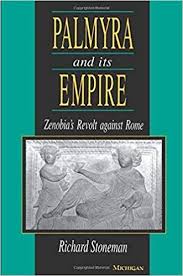 The author of The Map of Knowledge freely admits that her education was in Classics, so it was remiss in “non-Western” history. These gaps show up in the text of her book. For example:
The author of The Map of Knowledge freely admits that her education was in Classics, so it was remiss in “non-Western” history. These gaps show up in the text of her book. For example:
It helped that Sassanian culture was one of the most sophisticated and impressive on earth, and that Arab culture was young and relatively primitive. Just a few generations earlier, Muhammad’s people had been Bedouins, wandering the deserts of Arabia….
This seems plausible and uncontroversial to most people at first glance. Even more so to those who read their Ferdowsi. The problem is that even minimal reflection will indicate that this is just not true.
I have an advantage because last week I was on a podcast with a scholar of pre-Islamic Arabian literary culture (it’s already on the patreon page for patrons), so many facts are fresh in my mind. The fact is that the Arabs tribes were liminal to Romans and Persians for many centuries, and exhibited various degrees of integration with these larger civilizations.
 Philip the Arab was a Roman Emperor from 244 to 249. Though a part of the imperial ruling class, his father’s family was of Arab tribal origin. Later in the 3rd century, Zenobia, the queen of the Palmyrene Empire, was almost certainly a product of a partially Arab milieu. These were people operating trade between Rome and Persia. Further south, the Nabataeans founded the famed city of Petra.
Philip the Arab was a Roman Emperor from 244 to 249. Though a part of the imperial ruling class, his father’s family was of Arab tribal origin. Later in the 3rd century, Zenobia, the queen of the Palmyrene Empire, was almost certainly a product of a partially Arab milieu. These were people operating trade between Rome and Persia. Further south, the Nabataeans founded the famed city of Petra.
On the above podcast, the scholar who we interviewed mentioned that the Arabic in the Koran is clearly descended from the Arabic of the Nabataeans. The Nabataeans flourished in what is today Jordan and the Sinai, far to the north of Medina and Mecca. I won’t go into the revisionist scholarship about the origins of the Islamic Empire, but if you read The Map of Knowledge you receive a conventional history which reflects the telling of Muslim historians.
In this framework, Muhammad’s revelation was a miracle, because he was an illiterate Arab merchant operating far beyond the limes of civilization, in the midst of pagan Arabia. Despite many details which indicate that Mecca was a sophisticated urban society, there is also some perception of these city-Arabs as nomadic Bedouins, making their conquest of the Roman Near East and Persia even more amazing.*
In the revisionist frameworks, the first century of Islam was rather more like the conquest of the West Roman Empire by imperial federates and barbarian tribes just beyond the frontier. These were not totally raw and uncooked peoples, but groups with distinct identities from that of Romans, who nevertheless were highly Romanized. Obviously, this makes the conquest somewhat less amazing. But, it does make more comprehensible how the Arabs could take over both the East Roman and Persian apparatuses so easily: to some extent they had been part of the system of control.
* The allusion to the practice of polyandry in the stories of the origin of Muawiyah indicates that Bedouin practices were interleaved into the origin of Islam.